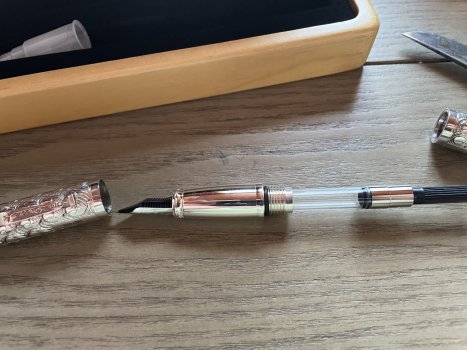I'd call any local source of ink a win! I can go to Office Max here and buy Parker and Waterman(long) cartridges in blue or black, and I think they may have one brand of international. Bottled ink is a never heard of it thing, though.
What brand(s) can you get locally? Hopefully they have Pelikan or Wateman for a safe easy option with a lot of colors, although a lot of Diamine inks are excellent and safe in most pens. Pilot makes some great inks too, and the iroshizuku by Pilot inks are fantastic(if not a bit expensive-but worth it) but many Pilot and Japanese inks in general(sailor and platinum) are known troublemakers in vintage pens with latex sacs. Some of the boutique brands like Noodlers, Private Reserve(one I use to buy locally all the time) and Organic Studios CAN be difficult inks to use in any pen.
Noodlers in particular comes with some baggage that may or may not bother you. It's quite literally one guy who makes over 100 different inks in his basement. Many are insanely permanent, many others are have some interesting properties, and some combine both of those into a single ink. The owners political views can be front and center through the names of inks, their colors and properties, and the label art(plus Nathan, the owner, is quite a student of history and there tends to be a lot on the labels to keep them interesting). There's been some more recent controversy that resulted in a bunch of inks being renamed. You can find that if you want. The other thing about Noodlers inks is that there's a certain ethos to the company that emphasizes quality and economy, and to that end he charges relatively low prices for his inks(currently most are $14 for a 3 oz bottle) and fills them absolutely to the brim(annoying so because plunging a pen into a new bottle will inevitably cause ink to run down the sides-I often pipette some out into a small vial to get the level a bit lower). I find that Noodlers inks in particular are very well behaved on lowest bidder copy paper and other common commodity papers papers, but can act up when used on good paper-normally with super long dry times(I've been taking meeting notes in in an A4 notebook of Oxford Optic paper with Liberty's Elysium, a normally well behaved semi-permanent blue and found that the first few lines were still wet enough to smudge/transfer by the time I got to the bottom of the page).
If you're close to a Montblanc dealer, generally they'll have a good selection of bottled ink. Depending on the size of the dealer and how "into" selling pens they are, you may only find blue/black/blue-black. I love Montblanc inks and their bottle is one of the better designs around plus very distinctive, and they're also generally safe in all pens. The only current MB ink I hold in disdain is Modena Red, which wouldn't be a horrible ink were it not for the fact that it replaced a fantastic red(Corn Poppy Red). If you find MB Corn Poppy, which was only discontinued a couple of years ago, grab a few bottles as even if you don't take to it, unopened bottles are reliably $40-60 on the secondary market.
MB makes a ton of limited edition inks, most of which come in 30 or 50mL "cube" bottles that are about $1/mL. I have a bunch of them-some are great colors and something interesting, while others are just okay. They have a habit sometimes of "recycling" an older LE ink under a new name. This is good in the sense that a lot of older LEs are a bit pricey on the secondary market, although they seem reluctant to recycle some of the real standouts like Shakespeare Velvet Red or DaVinci red chalk.
Just as a big caution, and I maybe should have put this first-be absolutely sure the inks you're buying are fountain pen inks and not "calligraphy" inks. Fountain pen inks are generally dye based, while a lot of calligraphy inks are meant to be used in dip pens and tend to have pigments that will clog fountain pens. This is also true of India Ink, which can have shellac and other bad players in addition to the carbon pigment. There are FP-safe pigment inks-they're a relatively new product and contain nanoparticle pigments that stay in suspension by Brownian motion. MB Permanent Blue and Permanent Black are in this category, as well as some Sailor inks. The MB inks meet ISO standards for permanence and were the first FP inks I'm aware of to carry that guarantee, although they're likely not the only that would meet it. There's also a Pelikan India Ink called Fount India that's supposed to be FP safe, but I've never tried it.


